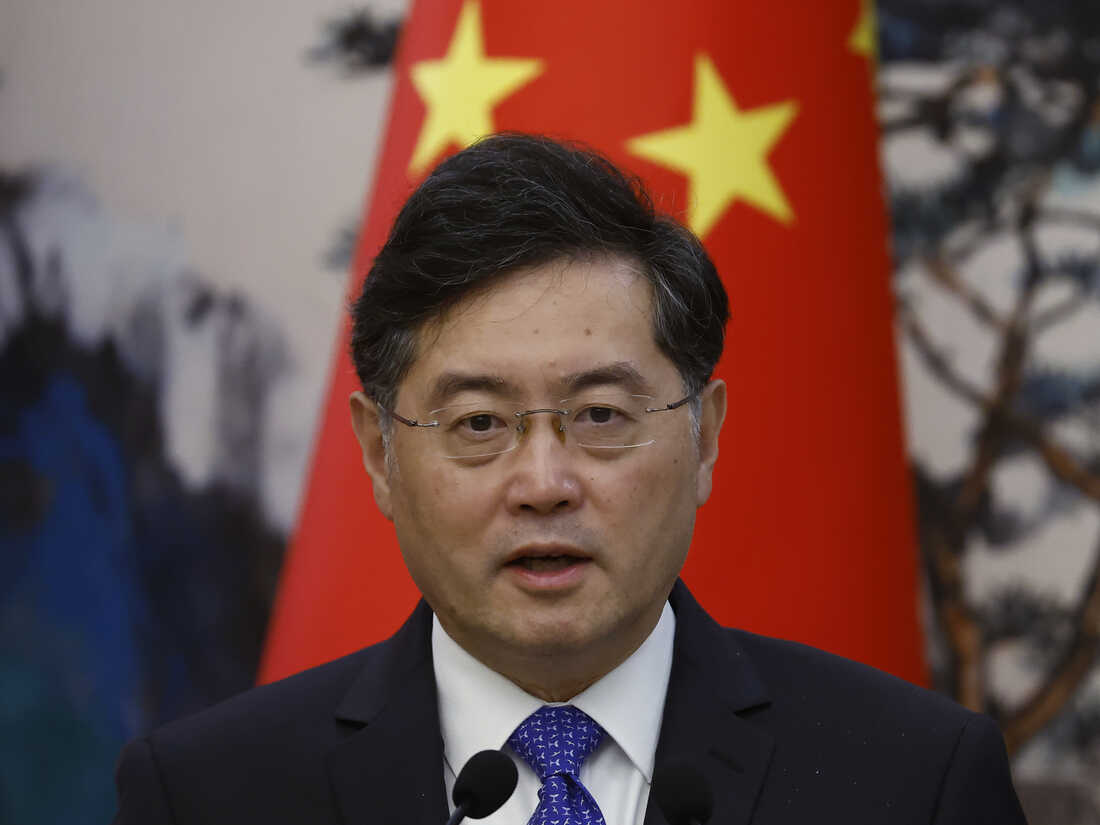
[ad_1]

U.S. Secretary of State Antony Blinken speaks at a chiefs of mission reception within the East Room of the White House in Washington, on Tuesday. Blinken heads to China on Friday to satisfy senior officers, his first go to as secretary of state.
Susan Walsh/AP
cover caption
toggle caption
Susan Walsh/AP

U.S. Secretary of State Antony Blinken speaks at a chiefs of mission reception within the East Room of the White House in Washington, on Tuesday. Blinken heads to China on Friday to satisfy senior officers, his first go to as secretary of state.
Susan Walsh/AP
TAIPEI, Taiwan — Rapprochement or retrenchment? Secretary of State Antony Blinken is headed to Beijing this weekend to satisfy with senior Chinese officers in a bid to enhance cratering U.S.-China relations, whilst each international locations pursue insurance policies designed to counter the opposite’s affect.
This is Blinken’s first journey to China as secretary of state — the primary by a member of President Biden’s Cabinet — which he was pressured to delay after the discovery, again in February, of a Chinese surveillance balloon in U.S. airspace.
Here’s why this journey issues.
This is a step towards communication
American officers are hoping that Blinken’s upcoming go to will pave the way in which for extra bilateral conferences and reestablish routine exchanges on diplomatic and commerce points. But specialists warning these conferences are only a starting as the 2 international locations determine compete and coexist with each other.
“The trip is the initial stage of an exploratory process to try to determine if there is mutual intent to moderate the relationship,” says Ryan Hass, a former official on the National Security Council through the Obama administration and now a senior fellow on the Brookings Institution.
Blinken’s journey builds on earlier conferences. In May, nationwide safety adviser Jake Sullivan met with China’s high diplomat, Wang Yi, in Austria. That was followed up by a go to from high Chinese commerce officers to Washington, D.C.
Yet progress is combined. Earlier this month, China’s protection chief Li Shangfu rejected a meeting request from U.S. Defense Secretary Lloyd Austin as a result of the U.S. sanctioned Li in 2018 for procuring Russian-made weapons for the Chinese army.
“It’s going to be hard because neither leader wants to be seen as caving to the other side or accommodating the other side’s demands or wishes,” Hass says.
Zhu Feng, a global relations professor at Nanjing University, says the onus is on the U.S. to first present it’s keen to compromise however he’s pessimistic any change will occur.
“Right now, the most important thing is the U.S. has locked in on China as its biggest strategic rival, and this is the consensus of the American entire strategic policy establishment, and so there cannot be any substantial movement on the current suppression of China,” says Zhu.
Neither China nor the U.S. is backing down on key points

Chinese Foreign Minister Qin Gang attends a joint information convention along with his Dutch counterpart Wopke Hoekstra (not pictured), following their assembly in Beijing, on May 23. Secretary of State Antony Blinken and Qin shared considerations on a telephone name this week forward of a deliberate go to by Blinken to China.
Thomas Peter/Pool Photo by way of AP
cover caption
toggle caption
Thomas Peter/Pool Photo by way of AP

Chinese Foreign Minister Qin Gang attends a joint information convention along with his Dutch counterpart Wopke Hoekstra (not pictured), following their assembly in Beijing, on May 23. Secretary of State Antony Blinken and Qin shared considerations on a telephone name this week forward of a deliberate go to by Blinken to China.
Thomas Peter/Pool Photo by way of AP
China’s Foreign Minister Qin Gang held a telephone name Tuesday with Blinken in preparation for his journey to China this weekend.
The U.S. State Department said Blinken “discussed the importance of maintaining open lines of communication to responsibly manage the U.S.-PRC [People’s Republic of China] relationship to avoid miscalculation and conflict, addressed a range of bilateral and global issues, and made clear the U.S. would continue to use diplomatic engagements to raise areas of concern as well as areas of potential cooperation.”
In China’s readout, the Foreign Ministry stated Qin addressed “new difficulties and challenges” within the international locations’ relations. Qin “stressed that the United States should respect them, stop interfering in China’s internal affairs, and stop undermining China’s sovereignty, security and development interests in the name of competition,” the Chinese readout stated.
“The phone call serves as a reminder to the U.S. side: we would not reject its request for a visit, but it must come only when it is made with sincerity and true intentions to improve bilateral relations,” Li Haidong, a professor on the China Foreign Affairs University who research the nation’s relations with the U.S., told the Global Times, a Chinese state-run tabloid.
Chinese officers and lecturers have been repeating this name for a present of “sincerity” from the U.S. at worldwide boards and in diplomatic statements up to now month. They have made these calls within the hopes of constructing on what Chinese officers name the “the Bali consensus”: requires larger engagement after an amicable in-person assembly between President Biden and China’s chief Xi Jinping in Indonesia final yr.
But there are differing conceptions of what that “consensus” even entails. “When the Chinese side says, ‘the Bali consensus,’ I’m not sure that they mean the same thing as the U.S. The U.S actually hasn’t used that phrase,” says Nathaniel Sher, a senior analysis analyst on the Carnegie Endowment for International Peace.
“Minister Qin has said he hopes U.S.-China relations can return to a healthy and stable development track, but this is simply wishful thinking,” says Zhu, the Nanjing University professor.
American officers are signaling the U.S. isn’t compromising on core points similar to semiconductor export controls, congressional visits to Taiwan and sanctions on Chinese officers over human rights violations, regardless of renewed diplomatic engagement with China.
“After investing at home and strengthening ties with allies abroad, now is precisely the time for intense diplomacy,” Kurt Campbell, the U.S.’ high coverage official on Asia, said during a briefing this week. “At the same time, there is nothing inconsistent with competing vigorously and talking with the PRC on a range of issues.”
Countries all over the world are intently watching

A members of the Philippine Coast Guard takes half in a simulation throughout a maritime train with Japan and U.S. Coast Guard on June 6, off the coast of Bataan province, western Philippines. The drills that came about in waters dealing with the South China Sea included maneuverings, maritime legislation enforcement and search and rescue at sea.
Jes Aznar/Getty Images
cover caption
toggle caption
Jes Aznar/Getty Images

A members of the Philippine Coast Guard takes half in a simulation throughout a maritime train with Japan and U.S. Coast Guard on June 6, off the coast of Bataan province, western Philippines. The drills that came about in waters dealing with the South China Sea included maneuverings, maritime legislation enforcement and search and rescue at sea.
Jes Aznar/Getty Images
Asian international locations are intently watching to see whether or not the U.S. and China can mend their fractious bilateral tensions — or threat spiraling right into a extra intense battle of their yard.
A recent poll of residents in South Korea, the Philippines and Singapore by the Eurasia Group Foundation discovered 90% of individuals are fearful a couple of geopolitical confrontation between the U.S. and China. At the identical time, 66% usually have optimistic views towards each the U.S. and China — however really feel pressured to choose a facet.
“[South Korea] was the most likely to fear that their domestic politics would intensify and polarize as a result of politicians being forced essentially to pick a side between the U.S. and China,” says Mark Hannah, an creator of the report.
Many Europeans are additionally feeling caught within the center. In a survey of 12 European Union member states commissioned by the European Council on Foreign Relations, 63% stated they imagine there’s a new chilly struggle growing between China and the U.S. However, most would favor to remain impartial within the occasion of a U.S.-China battle, according to a separate ECFR survey.
Aowen Cao contributed analysis from Beijing.
[adinserter block=”4″]
[ad_2]
Source link

